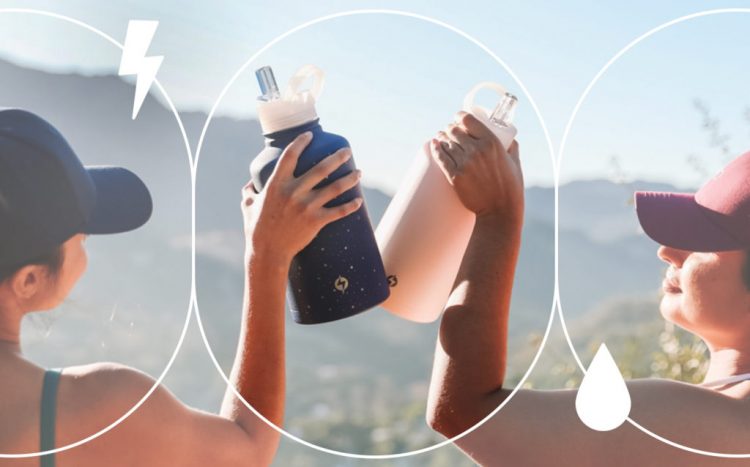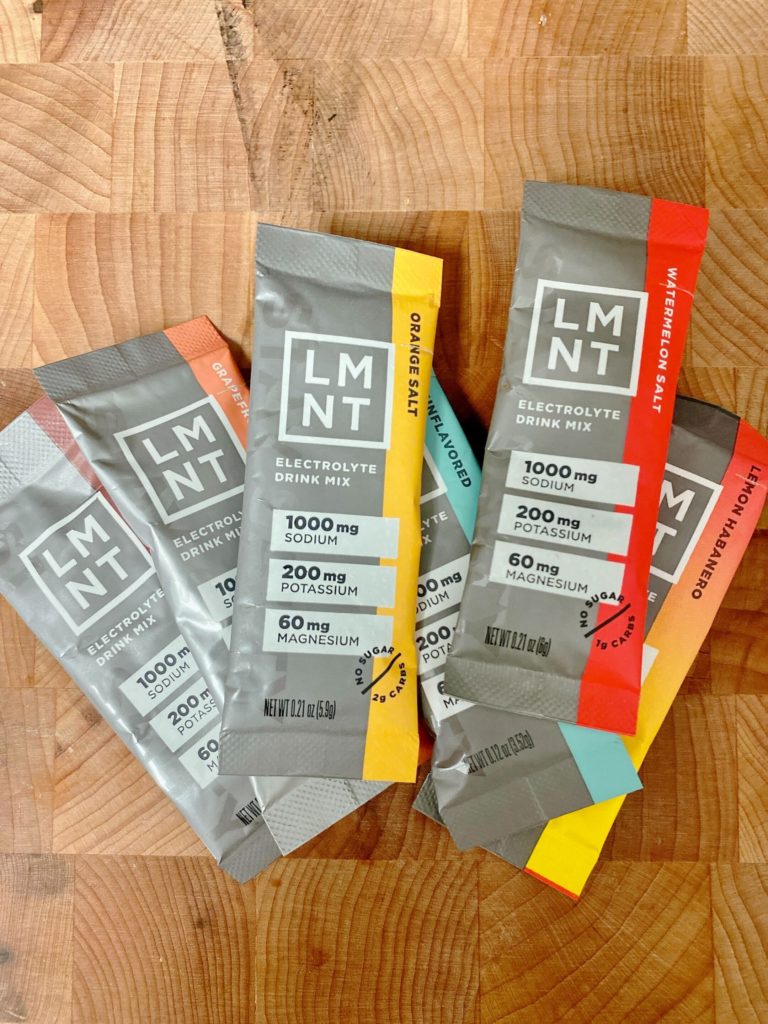Are Electrolytes the Secret to Better Workouts and Cured Hangovers?
If you work out pretty regularly, there’s a good chance hydration is already on your radar and you’ve at least heard of electrolytes.
The thing is… the two go hand-in-hand. Water hydrates the body, but you need electrolytes to balance fluids inside and outside of the cells. When you lose water through sweat, you’re losing electrolytes right along with it. But is this really something you should worry about? Isn’t rehydrating with water enough?
Fluid balance is complicated, but the short answer is YES, replenishing your body with electrolytes can be a big deal. And no, water isn’t always enough because it doesn’t have electrolytes. This isn’t anything new, yet it seems like electrolyte powders have recently taken over the sport recovery drink market with claims that go beyond just helping you rehydrate.
SO…
– Are electrolyte powders really worth the money?
– Will using them ACTUALLY make a difference in your workout?
– Should everyone use them, or just people who work out really hard?
– Can they really cure a hangover? 
Let’s find out.
What are Electrolytes?
Electrolytes are minerals that conduct electrical charges throughout your body. (Get it…electro-lytes?!). They’re literal transmitters for your nervous system to fire. They also produce energy, strengthen bones and regulate fluid balance (and since your body is 60% water, you can only imagine how important they are). Here are a few you probably hear about the most:
– Sodium: Regulates fluids and blood pressure; helps conduct nerve impulses
– Potassium: Allows blood to flow through vessels, helps nerve impulses fire, and balances blood pressure
– Magnesium: Aids muscle contraction, regulates blood sugar, assists in energy production
We excrete electrolytes through sweat, urine, and waste, and replenish them through what we eat, drink, and supplement.
When electrolytes are low or out of balance in your body, you might feel low on energy, making it hard to power through your workouts, despite being well rested. You might also get muscle cramps, feel dehydrated, and pee frequently, regardless of how much water you’re consuming.
Put Some Salt on It
Most of us have been taught to watch our sodium… so shouldn’t we be HAPPY to sweat it out? Contrary to a lot of literature out there, salt isn’t always the devil its been made out to be. It’s actually key for many functions in the body…like fluid balance. You might even feel more hydrated just upping your water intake a bit, and salting your food more generously.
Obviously, if you have hypertension or have been advised by your doctor to steer clear of sodium, listen. However, according to Robb Wolf, cofounder of LMNT, it’s not so cut and dry. “The data aren’t consistent. Take the Intersalt Study, published in 1988, which looked at sodium and blood pressure in over ten thousand people across 52 regions of the world. In the vast majority of populations, researchers observed no link between sodium intake and high blood pressure. But some outlier populations stood out.”
Electrolyte-Rich Foods
Adding (or being aware of) food that contain electrolytes enhance your chances of staying well hydrated. Top options include:
- Fruits, including bananas, watermelon, and lemons
- Leafy green veggies and avocados
- Whole grains
- Nuts and beans
- Pickle juice
- Potatoes
- Sunflower and pumpkin seeds
The Top Reasons to Take Electrolytes
If you fall into one of these categories, an electrolyte supplement might be worth a try.
1. You have frequent signs of dehydration
Most of us have felt the effects of being dehydrated. If you frequently get thirsty, you’ve probably gone too long without water, or haven’t consumed enough. According to the Cleveland Clinic, “The best way to beat dehydration is to drink before you get thirsty. If you wait until after you’re thirsty, you’re already dehydrated.”
Another sign…how often you urinate.
Most people typically pee 6-7 times per day. If you’re not using the bathroom at least that many times, try drinking more water to assess how you feel, how often you’re urinating, and examine the color. (TMI? Nah. This is important body intel you need to know!).
If you frequently get headaches, feel brain-foggy, get dizzy or light-headed, feel tired, have a dry mouth, get constipated, have a high heart rate but low blood pressure or have dark colored urine, you’re likely dehydrated.
2. You have an active lifestyle
According to the International Society of Sports Nutrition (ISSN), an athlete can have a noticeable decrease in exercise performance when they lose 2% or more of their body weight through sweat. This can happen within 60 to 90 minutes of exercise.
How many electrolytes you lose during exercise depends on weight, fitness level, intensity, duration of activity, humidity and how much you sweat. But how you feel is completely individual. Many sports enthusiasts claim they feel much more energized, recover faster, and feel cramp-free when they supplement.
If you exercise heavily or for long periods of time, adding an electrolyte powder to your water bottle might be worth a try.
3. You eat a low carb/keto diet
Low carb diets typically restrict hydration-rich fruits and veggies. Limiting carbs also decreases insulin levels, which causes the kidneys to excrete extra sodium. This is one reason why people on low carb diets have headaches, fatigue, and cramping.
If you follow a low carb diet, be mindful about replenishing sodium either through your diet or with an electrolyte supplement.
4. You live in a hot/humid climate
This one’s pretty obvious, but if you live in a hot and/or humid climate, you’re going to sweat more. Replenishing your electrolytes could help you stay hydrated.
5. You have dietary deficiencies
Restrictive diets, food allergies, and malnutrition due to illness or other reasons all increase the risk of dehydration and electrolyte deficiency.
My Favorite Ways to Supplement Electrolytes
- Coconut water: this all natural option is rich in potassium, magnesium and calcium. Some brands add sugar, so be sure you check your labels. Try making some fun summer popsicles using coconut water and fresh fruit for a delicious and hydrating snack.
- LMNT: These 5-calorie packets come in a variety of flavors, including watermelon, raspberry and even chocolate. Add to 40 or so ounces of water and sip during and after your workout and see if you feel a difference in your energy. (And no, they don’t contain caffeine). Beware…these are SALTY. But that’s what makes them so beneficial. So dilute until the taste suits you.
- Nuun Hydration: These fizzy little tablets offer a ton of fun flavors, a little zip of bubbles and clean ingredients with only 1 gram of sugar and 15 calories. They contain sodium (300 mg), potassium and magnesium and come in a small container, which makes them highly portable.
- Bone broth: This option probably won’t sound too great for your gym time, but sipping on bone broth during the day or at night not only helps you stay hydrated, but also provides protein and minerals that aid in hydration. Studies have shown that drinking broth can rehydrate better than water alone due to the electrolytes. Try making your own, or buy some fresh, frozen or boxed varieties from the grocery store.
*This post may contain referral links for products we love, and all opinions are our own. Blogilates.com earns a small commission from these links, at no additional cost to you.
Are Electrolyte Powders Worth the Hype and Money?
The answer is: it depends. People who regularly supplement actually FEEL it in the gym. Without any stimulants at all, proper hydration can help you feel stronger in the gym with more endurance. If you’re more of a recreational athlete, or exercise where it’s not too hot, you might be just fine without them (provided you do keep yourself adequately hydrated). But if you hit it hard in the gym, do a little experiment to see if your performance and energy improve.
Will They Cure My Hangover?
Most hangovers occur from dehydration, electrolyte imbalance and blood sugar imbalance, which are all worsened by vomiting.
So, it makes perfect sense to do two things: replace your electrolytes and avoid sugar. Most people pop some Advil and pray to heaven that the misery will pass without doing the one simple thing their body needs, and that’s to rehydrate.
Alcohol is a diuretic, meaning that it dehydrates your body and causes frequent urination. When people suffer from a hangover, the dehydration makes it challenging for the body to flush out the toxins in the alcohol consumed the night before. “Since electrolytes replenish your body with the minerals you need to expel toxins and retain fluid, they are one of the best hangover remedies to kick your hangover to the curb,” according to AdaptedNutrition.com.
That’s reason enough to at least keep some in your pantry, right?!
The Bottom Line
If you exercise moderately an hour or less per day, drinking water and eating foods rich in electrolytes likely suffice. However, if you train for over 60 minutes, workout intensely, especially in high heat, or are a heavy sweater, electrolyte supplementation could be helpful. Test some out and see how you feel both in, and out of the gym. They’re a safe, low priced supplement, and might even seriously improve the way you feel. You’ve got nothing to lose by experimenting!

Source by www.blogilates.com






